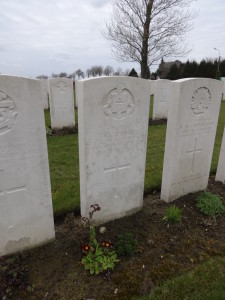 Regiment: 9th Battalion, Royal Sussex Regiment
Regiment: 9th Battalion, Royal Sussex Regiment
Service No.: G/14180
Date and place of birth: 4th quarter, 1897 in Trotton
Date and place of death: 6 August 1917 (aged 19) near Ypres, Flanders
Although William Hall was born in neighbouring Trotton parish, he lived most of his life in Elsted, where his father worked as a cowman. William was injured in the Third Battle of Ypres, and died of his wounds.
Family background
William Henry Hall’s birth was registered at Midhurst in the fourth quarter of 1897. The 1901 and 1911 censuses give his place of birth as Trotton. He was the son of Henry Hall and his wife Mary, née Russell, both of whom were born in 1875.
Henry Hall was born in Harting, where he was baptised on 25 July 1875. In the 1891 census, he was living with his parents, Albert and Caroline, at Hurst Road, West Harting. In the spring of 1896, he married Mary Russell, who had moved from West End, near Southampton, to Iping as a child.
In the 1901 census, Henry, described as a cowman, aged 25, and Mary were living at Station Road, Elsted with three children, including William, aged 3. Ten years later, Henry was still living at Station Road with six children; at the time of the census, Mary was a patient in the West Sussex Infirmary in Broyle Road, Chichester. The censuses show that the couple had had nine children, three of whom had died.
Military service
In September 1916 at West Lavington, William enlisted into the 9th Battalion of The Royal Sussex Regiment. The 9th Battalion had been formed at Chichester in September 1914 as part of Kitchener’s New Army. The battalion’s first engagement came at the Battle of Loos in September 1916, in which it suffered heavy losses.
After his initial training, William was sent to the Western Front as part of the British Expeditionary Force in the spring of 1917. In early June 1917, the battalion took part in the Battle of Messines. After a short period of recovery, in July the battalion were back in action at Pilckem Ridge, which was the opening attack of the main part of the Third Battle of Ypres.
During the battle, between 31 July and 2 August, the Royal Sussex Regiment suffered about 200 casualties, although overall the attack was an allied success.
Death and commemoration
William Hall was injured during the battle and died of his wounds on 6 August. He was originally buried on the battlefield near where he died, but on 29 August 1919, his body was recovered and re-interred at the Aeroplane Cemetery in the outskirts of Ypres.
He was awarded the British War Medal and the Victory Medal and is commemorated on the War Memorial plaque at Treyford.